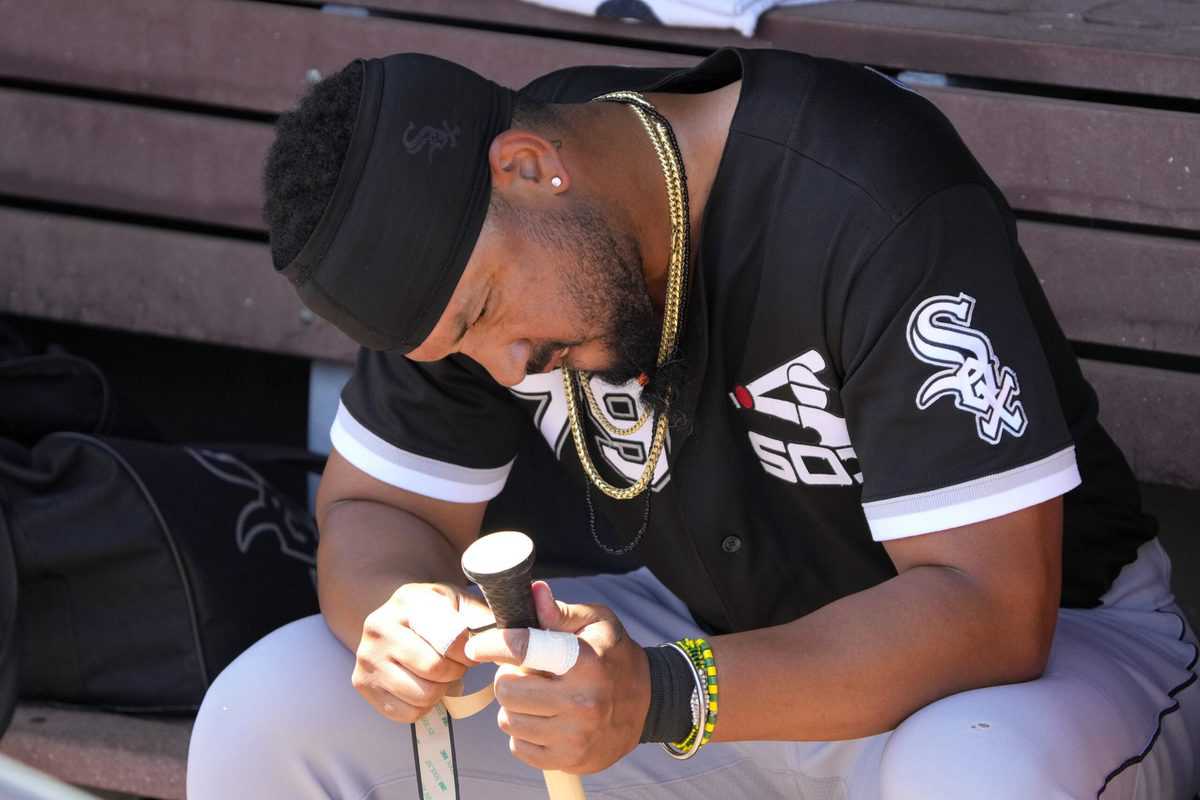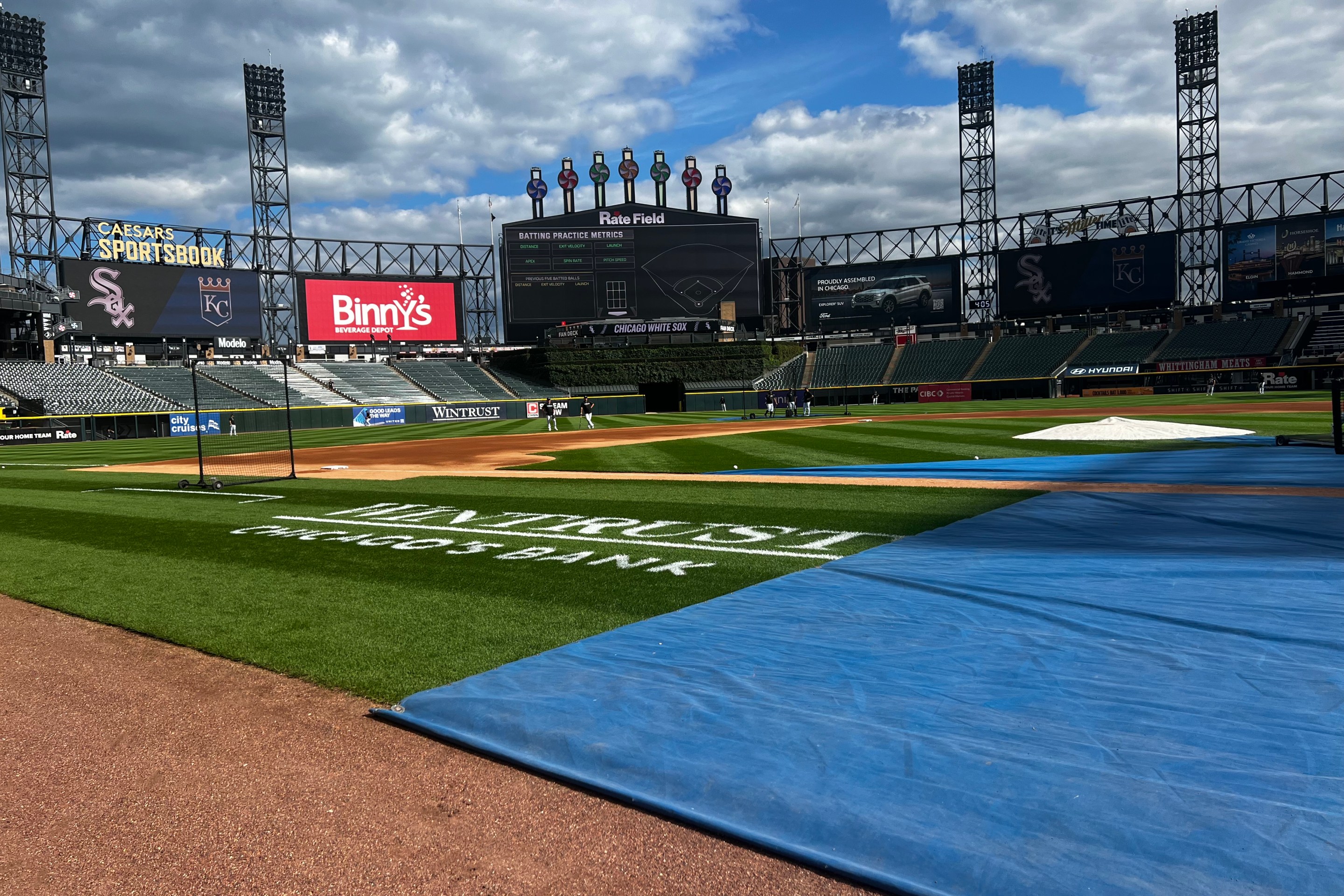José Abreu was a little bit Paul Konerko, in the sense that they both anchored first base and led by an example few could apparently follow. But he maintained more athleticism and a healthier level of outward enjoyment of the game, and that kept his lows much higher than Konerko's, while Konerko had the postseason highs that Abreu got only a sliver of a chance of duplicate.
José Abreu was a little bit Harold Baines, in the sense that Abreu's startling consistency and knack for driving in runs created a nine-year stretch of statistics that would slot comfortably within most Hall of Fame résumés, Baines' included. But Baines did it from 21 through 40, while Abreu's MLB debut was delayed due to geopolitical reasons, so compiling his way to Cooperstown doesn't appear possible.
José Abreu was also a little bit Frank Thomas, in the sense that they're both first basemen and on the franchise's short list of American League MVP winners. Abreu lacked Thomas' elite plate discipline and gargantuan strength, although Thomas would've killed for Abreu's throwing abilities.
José Abreu was also a little bit Minnie Miñoso, in the sense of continuing, then taking ownership of the team's proud Cuban tradition. But while the differences in personalities and eras led Miñoso to cast the language barrier aside, Abreu stood behind it, so his connection to the fan base always came with a chaperone.
José Abreu the player brings to mind a number of modern White Sox greats, but José Abreu's career stands alone in the sense of how little help he had.
Since integration, whenever the White Sox have produced a position player fixture, they've often been able to produce a second, and usually a few sturdy regulars right behind them. Even Baines had Carlton Fisk as a running mate during an equally depressing 1980s.
But Abreu came to the Sox in the middle of a first rebuild, survived a second one after the first spectacularly collapsed due to the Sox's organizational shortcomings, then watched the second one stagnate due to the Sox's organizational shortcomings. The White Sox succeeded immensely by signing him, then spent most of the next nine years failing him.
The amount of turnover he witnessed doesn't really have a peer in the New Comiskey Park era. When you look at the plate appearances or Wins Above Replacement leaderboards during the first nine seasons of Konerko and Abreu, you see mostly Good White Sox, with the rankings determined by more by timing than talent.
When you look at the top 10 White Sox plate appearance leaders during Abreu's career, it comprises an alarming amount of bench players.
Plate appearances over nine-year stretches
| 1990-98 | 1999-2007 | 2014-22 |
|---|---|---|
| Frank Thomas 5,502 | Paul Konerko 5,511 | José Abreu 5,506 |
| Robin Ventura 5,252 | Carlos Lee 3,647 | Tim Anderson 3,284 |
| Ozzie Guillén 3,525 | Magglio Ordónez 3,563 | Yoán Moncada 2,720 |
| Lance Johnson 3,489 | Frank Thomas 3,101 | Yolmer Sánchez 2,459 |
| Tim Raines 2,873 | José Valentín 2,750 | Leury García 2,291 |
| Ray Durham 2,590 | Joe Crede 2,637 | Avisaíl García 2,190 |
| Ron Karkovice 2,415 | Ray Durham 2,505 | Adam Eaton 2,152 |
| Joey Cora 1,463 | Juan Uribe 2,151 | Melky Cabrera 1,757 |
| Dave Martinez 1,420 | Aaron Rowand 1,823 | Adam Engel 1,540 |
| Albert Belle 1,407 | Jermaine Dye 1,751 | Eloy Jiménez 1,288 |
The bWAR list replaces the names with some more impressive candidates, but the WAR totals themselves come up way short compared to the other columns.
bWAR over nine-year stretches
| 1990-98 | 1999-2007 | 2014-22 |
|---|---|---|
| Frank Thomas 50.5 | Magglio Ordóñez 23.5 | José Abreu 31.9 |
| Robin Ventura 39.3 | Paul Konerko 18.8 | Tim Anderson 18.2 |
| Lance Johnson 20.7 | Frank Thomas 17.8 | Adam Eaton 16.0 |
| Tim Raines 16.6 | José Valentin 16.9 | Yoán Moncada 13.8 |
| Ron Karkovice 12.4 | Carlos Lee 15.8 | Luis Robert 7.5 |
| Dave Martinez 10.1 | Ray Durham 13.2 | Yolmer Sánchez 7.0 |
| Craig Grebeck 8.8 | Aaron Rowand 12.7 | Avisaíl García 6.1 |
| Albert Belle 8.8 | Joe Crede 10.0 | Eloy Jiménez 5.3 |
| Ray Durham 8.2 | Jim Thome 10.0 | Todd Frazier 5.3 |
| Carlton Fisk 6.4 | Chris Singleton 8.2 | James McCann 4.9 |
The best sidekick is Tim Anderson, whose transformation into a great shortstop coincided with a degradation into an injury-prone one. Abreu played in 96.7 percent of the White Sox's games over the last four years. Anderson could only take the field in 68.4 percent of them.
The other competition is Adam Eaton, who peaked as a player at the same time his weaknesses as an adult were revealed. The White Sox had multiple flare-ups in 2016 that caused the White Sox to tear it all down, and Eaton managed to take a supporting role in all of them (calling Drake LaRoche a leader, fighting Todd Frazier, snaring Chris Sale's throwback jersey). Perhaps Abreu will write an autobiography to let everybody know what he thought about the divisions during L'affaire LaRoche at a time where he hadn't seen his son in two years.
Basically, in order to find a teammate who fits the "reliable" label in all respects, James McCann is the only one who fits the bill. Even then, Tyler Flowers and Yasmani Grandal would crowd him out of the top 10 if you arranged the list by fWAR because it incorporates their framing.
The shape of Abreu's career, and how little the White Sox accomplished in spite of it, feels more like a relic of the 30 years between the Black Sox Scandal and the Go-Go Sox, when the Sox were lucky to have even one standout position player for three years in a row.
That's one of the few ways Abreu brings to mind Luke Appling, aside from the unshakeable above-averageness and shared Aches and Pains, except Abreu could've complained a lot more about his.
Here's who Appling played alongside during his first nine full seasons as a regular, spanning 1932 to 1940.
| PA | bWAR |
|---|---|
| Luke Appling 5,270 | Luke Appling 41.3 |
| Jackie Hayes 3,455 | Zeke Bonura 15.7 |
| Mike Kreevich 3,104 | Mike Kreevich 13.1 |
| Rip Radcliff 3,028 | Al Simmons 10.6 |
| Zeke Bonura 2,378 | Joe Kuhel 7.7 |
| Jimmy Dykes 2,358 | Jackie Hayes 6.1 |
| Mule Haas 2,112 | Jimmy Dykes 6.0 |
| Al Simmons 1,823 | Larry Rosenthal 5.9 |
| Joe Kuhel 1,819 | Evar Swanson 5.4 |
| Luke Sewell 1,665 | Tony Piet 5.2 |
It's a fun exercise to scroll between the peers of Abreu and Appling and wonder which current White Sox players will have any resonance among White Sox fans 80 years from now. Zeke Bonura is a lot of fun, and the White Sox caught the last two years of Simmons' Hall of Fame peak, but the rest of the list only surfaces in Ted's Saturday Sporcles.
(Jackie Hayes was worth 6.1 WAR during his White Sox career, but was also 6.1 Wins Below Average, which made him the Leury García of his time.)
The contract Abreu signed with the Houston Astros -- three years, $58.5 million -- provides as much closure as possible for a departure that will inevitably leave some raw feelings. Going back to McCann, his four-year, $40 million deal with the Mets made moot any discussion of the White Sox finding a way to make it work, because the dollars just didn't make sense when looking at the payroll. The way McCann's Mets career has unfolded/unraveled reinforces the whole sentiment of "smile because it happened."
Abreu is, was and never will be the problem with the White Sox, but letting him go via free agency was always the easiest way to start untying the knots that cut off circulation to various limbs of the roster. He seemed to know it, and his openness to the idea of playing elsewhere throughout the 2022 season suggested that he'd welcome a less fraught environment, assuming he'd be paid accordingly. He will be, so good for him.
If anybody looked ready to take the baton, it'd be a way easier discussion. The Cardinals seamlessly replaced Albert Pujols with Allen Craig, with an assist from an emerging Matt Carpenter. Juan Soto allowed the Nationals to let Bryce Harper leave. Both departing stars had superior track records to Abreu, but both of those teams had superior depth to the White Sox, and time proved both teams correct in short order.
The White Sox don't deserve the benefit of the doubt when it comes to picking up the slack. There are candidates, certainly. Eloy Jiménez and Luis Robert have shown it in bursts. Yoán Moncada showed it for one season. Andrew Vaughn looks like he'll have to accept the bulk of the responsibilities, but the White Sox rushed him to the majors, and he hasn't shown the power, plate discipline, defensive aptitude or durability to be a bankable asset.
As a result, Abreu's departure is simultaneously a smart decision and such a severe risk during what's supposed to be the middle of the White Sox's contention window. The front office spent the last two seasons dicking around to the point that Rick Hahn can't even meet what he thought was a low bar:
“You’ve got to set the bar high,” Hahn said. “That's how we set the bar. And should we ultimately fall short of it and be held accountable for that, that's OK. … A lot gets made of my comments during the (Bryce) Harper (and Manny) Machado free agency, where I talked about how we deserved a seat at the table. People have now turned that into a bit of a mocking thing when we don't sign somebody. So instead of sitting at the table, which is fine, we didn't convert on that. So we wear it.
“I think the message that this is an organization that is a potential destination for premium players is an important one. That's who we want to be. That's an organization we want to have. This is our aspiration. I'd rather aim high than manage expectations like, ‘Hey, we made it to the postseason consecutive years for the first time in franchise history — success.’
They barely did that! The division title in 2021 is a palpable triumph despite the four-game loss to the Astros in the ALDS, but the other postseason appearance was as a third-place team with the AL's seventh seed in a 60-game season. Technically, it counts as a postseason appearance. But with the White Sox still unable to advance into October under standard schedules and postseason structures, I think it's fair to vacate its standing as an accomplishment.
(Also, I want to acknowledge the phrase "potential destination for premium players," which is maybe the funniest way Hahn has ever packaged and sold nothing.)
I have never understood Hahn's preference for auspicious rhetoric when they can't even get the basics down. It reminds me of the opening scene in "Hot Rod" when he attempts to jump the mail truck even though the answer to the first and only question should've told him to pump the brakes:
"Kevin -- did you reinforce the takeoff ramp?
"No, we didn't have time."
In both cases, a less-than-thorough process generated disastrous results.
Hahn can talk about premium free agents and seats at the table and parades, but he has to realize that for one reason or another -- poor leadership, talent evaluation and/or injury management -- the White Sox couldn't even furnish a second consistently good hitter for Abreu over nine seasons and two rebuilds.
The imbalance is so stark that Abreu's departure might force a reckoning. The kid who's been carrying the class project for the lab group suddenly transferred, and maybe the shock will get the slackers to raise their games. That wouldn't reflect well on Abreu's ability to lead, but after nine years, the White Sox should've had a firmer grasp on the effects of Abreu's presence anyway.
The situation is such that it's better if Abreu loses a little of that stature after the fact, because it's far more watchable than a plausible alternative in which Abreu was the guy who kept the lineup card from deteriorating under the weight of Jerry Narron's calligraphy.
Again, it's remarkable that the White Sox have to conduct such a significant experiment during what was supposed to be the surest part of their window. Just like it's remarkable that the White Sox built so little during a nine-year run that was nothing short of remarkable. Shout-out to the word "remarkable," which can be correctly applied to José Abreu's excellence and the White Sox front office's glaring inadequacies and while still retaining its shape.






